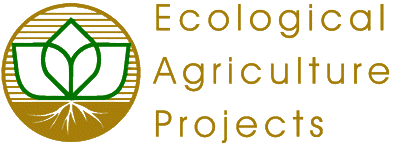

EAP Publications | Virtual Library | Magazine Rack | Search | What's new
Join the Ecological Solutions Roundtable
Results of a survey of 42 organic producers in Saskatchewan; personal interviews; both certified and transitional; no attempt to undertake detailed statistical analysis.
Estimate of Saskatchewan's organic land base (certified and in transition) at about 200,000 acres with 250-300 producers
Net returns are reported to be about the same or higher; green manure and forage frequently used to improve soils; insects and diseases not of particular concern; limited need for more information; marketing problems reported.
Why were farmers involved with organic? - The most common response was concern for environment; soils, water supplies; some reported problems with feeling sick for various reasons; feelings that they have lost control of their operations and are controlled by financial industry.
- 22 of producers certified, 14 in transition
- transition period average of 6.8 years
- total of 34,152 acres in organic production; 932 acres on average/farm
Size Number of farms
0-400 |
15 |
500 - 999 |
10 |
1000 - 1999 |
8 |
2000 and over |
4 |
Most producers are recent entrants, acreage ranges from 10-4800 acres; primary crops are wheat, oats, barley; few reported keeping animals.
Although many grew a variety of crops, 7 grew only wheat, or wheat and one other crop.
Yields were the same or slightly below conventional with net returns about the same; some indication that yields are higher than conventional in dry years.
Yield data are reported for a variety of crops, but there are no more than 11 observations for any crop; crops are those typically grown in western Canada: wheat, oats, barley, canola, rye, durum, lentils
24 reported weeds as the largest problem; other problems mentioned but none by a majority of producers; most common control strategies were harrowing; higher seeding rates, late seeding.
Livestock - only 13 reported organic or near organic livestock; problems cited included: standards, source of replacement stock; supply of feed; organic control measures for animal diseases; lack of slaugtering facilities; beef stabilization program requirements that animals must be sold through the agency; problems with lack of facilities for processing organic milk.
Organic meat, poultry, eggs and milk are sold directly to consumers at the farm gate.
Standard marketing problems cited, but a unique problem was explained with respect to the Canadian Wheat Board - organic producers obliged to sell to the CWB and then buy their grain back before they can market it.
primary certification groups -
Canadian Organic Producers Marketing Cooperative Limited, 1983 (COPMCL) 165 members in Manitoba, Sask and Alberta (135 in Sask); marketing and certification cooperative.
OCIA - about 150 certified in Sask in 1990.
Copyright © 1990 Green, C.O.. Reprinted with permission. All rights reserved.
Info Request | Services | Become EAP Member | Site Map
Give us your comments about the EAP site
Ecological Agriculture Projects, McGill University (Macdonald
Campus)
Ste-Anne-de-Bellevue, QC, H9X 3V9 Canada
Telephone:
(514)-398-7771
Fax:
(514)-398-7621
Email: eapinfo@macdonald.mcgill.ca
To report problems or otherwise comment on the structure of this site, send mail to the Webmaster